
Research
The Swette Center supports transdisciplinary research that is solutions- and impact-oriented. It is a hub for faculty members engaged in food systems research, as well as a source of research opportunities for students passionate about working on food system transformation.
The Swette Center is part of the Julie Ann Wrigley Global Futures Laboratory, an initiative committed to use-inspired research that sustains global habitability and improves well-being for all humankind. Research at ASU is rooted in innovation, service, and impact, reflected in ASU’s ranking from the National Science Foundation as the top university for transdisciplinary research. On top of this, ASU is widely recognized as the #1 university in the US for innovation, #1 for sustainability practices, and #1 for addressing the UN SDGs.
Team publications
This collection includes peer-reviewed journal articles, publications in The Conversation, and reports authored by the Center’s core team and senior fellows.
The Conversation
- Neubert, C. & Merrigan, K. (2026, January 7). Why 2026 could see the end of the Farm Bill era of American agriculture policy. The Conversation. https://theconversation.com/why-2026-could-see-the-end-of-the-farm-bill-era-of-american-agriculture-policy-270722
Reports

This is the second of three reports by our Hawai’i-based Swette Center team for the project Enhancing Hawaiʻi’s Food Security through Aquaculture. The report draws on stakeholder interviews, aquaculture producer and commercial seafood buyer survey data, as well as industry landscape research. It provides an in-depth look at the seafood value chain from inputs to marketing/distribution, as well as the enabling environment and permitting requirements. It concludes with actionable recommendations for all interested stakeholders.
Journal articles
- Bellon, M. R., Benard, N., Coghlan, J. E., & Merrigan, K. (2025). Towards a More Holistic Comparative Assessment of Plant-Based Alternative Beverages and Dairy Milk: A True Cost Accounting Approach. Foods, 14(13), 2196. https://doi.org/10.3390/foods14132196
The Conversation
- Merrigan, K. (2025, January 21). Agriculture secretary oversees food production, rural life, and nutrition programs that help millions afford healthy diets. The Conversation. https://theconversation.com/agriculture-secretary-oversees-food-production-rural-life-and-nutrition-programs-that-help-millions-afford-healthy-diets-245501
Reports

Loko Iʻa for Agroecosystem Resilience
This is one of three final reports for the project Enhancing Hawaiʻi’s Food Security through Aquaculture, examining the market and supply chain needs for Hawaiʻi’s aquaculture industries. This report is focused on traditional Native Hawaiian aquaculture systems, loko iʻa, their potential to contribute to the local food system, and the development of frameworks to measure the ecosystem services and certify culturally aligned production.
Journal articles
- Bellon, M. R., Benard, N., Vizcaino, M., Merrigan, K., & Wharton, C. (2024). True Cost Accounting Using Life Cycle Assessment Methods and Data: A Case Study Comparing Palm, Rapeseed, and Coconut Oils for Sustainability and Nutrition. Sustainability (Switzerland), 16(23), Article 10366. https://doi.org/10.3390/su162310366
- Bellon, M. R., Hanley, C. M., Jablonski, B. B. R., Jablonski, K., Garry, F., Rhodes, R., Natarajan, M., Benard, N., & Merrigan, K. (2024). Assessing the contribution of nonmarket factors to the market value generated by cow-calf operations in rangelands of the western USA: A true cost accounting approach. PloS one, 19(5), Article e0296665. https://doi.org/10.1371/journal.pone.0296665
- De Meester, L., Vázquez-Domínguez, E., Kassen, R., Forest, F., Bellon, M. R., Koskella, B., Scherson, R. A., Colli, L., Hendry, A. P., Crandall, K. A., Faith, D. P., Starger, C. J., Geeta, R., Araki, H., Dulloo, E. M., Souffreau, C., Schroer, S., & Johnson, M. T. J. (2024). A link between evolution and society fostering the UN sustainable development goals. Evolutionary Applications, 17(6), Article e13728. https://doi.org/10.1111/eva.13728
- Klaus, L. M., Riemer, O. & Müller, A. (2024). Changing the Equation: Leveraging True Cost Accounting to Accelerate Agri-Food Systems Transformation. In FORESEE (4C) – The Transformation of Agri-Food Systems in Times of Multiple Crises (4 Cs: Climate, Covid-19, Conflict, Cost of externalities). Berlin: TMG – Think Tank for Sustainability. Report 5. https://doi.org/10.35435/1.2024.2
- Mastretta-Yanes, A., Tobin, D., Bellon, M. R., von Wettberg, E., Cibrián-Jaramillo, A., Wegier, A., Monroy-Sais, A. S., Gálvez-Reyes, N., Ruiz-Arocho, J., & Chen, Y. H. (2024). Human management of ongoing evolutionary processes in agroecosystems. Plants People Planet, 6(6), 1190-1206. https://doi.org/10.1002/ppp3.10521
- Monroy-Sais, A. S., Tobin, D., Bellon, M. R., Astier, M., Cibrián-Jaramillo, A., Gálvez-Reyes, N., Mastretta-Yanes, A., Ruiz-Arocho, J., Wegier, A., & Chen, Y. H. (2024). Smallholder farmers’ diverse values in maize landrace conservation: A case study from Chiapas, Mexico. Journal of Rural Studies, 110, Article 103347. https://doi.org/10.1016/j.jrurstud.2024.103347
The Conversation
- Merrigan, K. (2024, February 28). The true cost of food is far higher than what you spend at the checkout counter. The Conversation. https://theconversation.com/the-true-cost-of-food-is-far-higher-than-what-you-spend-at-the-checkout-counter-217883
Reports

Grow Local Tempe
Urban agriculture can offer a multitude of benefits including nutrition security, community cohesion, economic prosperity, environmental health, ecosystems services, and cultural sustainability. For Tempe specifically, integrating urban agriculture into the city’s landscape presents an innovative and powerful approach to address numerous community challenges. Presented as an active record of the community’s engaging spirit, preferences, and concerns, this report charts a path forward to continue Tempe and the community’s efforts towards a vibrant and flourishing urban agriculture landscape.
Journal articles
- Bellon, M. R., Ntandou-Bouzitou, G., Lauderdale, J. E., & Caracciolo, F. (2023). Combining market and nonmarket food sources provides rural households with more options to achieve better diets in Southern Benin. Food Security, 15(2), 411-422. https://doi.org/10.1007/s12571-022-01320-w
The Conversation
- Merrigan, K. (2023, May 8). These four challenges will shape the next farm bill – and how the US eats. The Conversation. https://theconversation.com/these-four-challenges-will-shape-the-next-farm-bill-and-how-the-us-eats-202555
The Conversation
- Merrigan, K. (2022, January 21). What is bioengineered food? An agriculture expert explains. The Conversation. https://theconversation.com/what-is-bioengineered-food-an-agriculture-expert-explains-175003
- Merrigan, K. (2022, June 14). Fertilizer prices are soaring – and that’s an opportunity to promote more sustainable ways of growing crops. The Conversation. https://theconversation.com/fertilizer-prices-are-soaring-and-thats-an-opportunity-to-promote-more-sustainable-ways-of-growing-crops-183418
Reports

Unveiling the Hidden Capitals of Cow-Calf Operations in Rangelands of the West
Beef livestock ranching is an important agricultural activity rooted in the history of the American West. Despite the long history and culture surrounding cattle and ranching in the West, recent times have left many cattle ranchers feeling under attack as media attention has highlighted potential environmental impacts of cows and health concerns around red meat. As these generalizations influence consumer perceptions around beef consumption, there is a need to employ a more robust understanding of beef livestock production as a complex socio-ecological system.
The Swette Center and Colorado State University collaborated on this pilot study to assess ranching in Arizona and Colorado using the TCA approach. Our results document the complexity of analyzing ranching in the West and provide monetary estimates that capture key benefits and costs in cattle production.
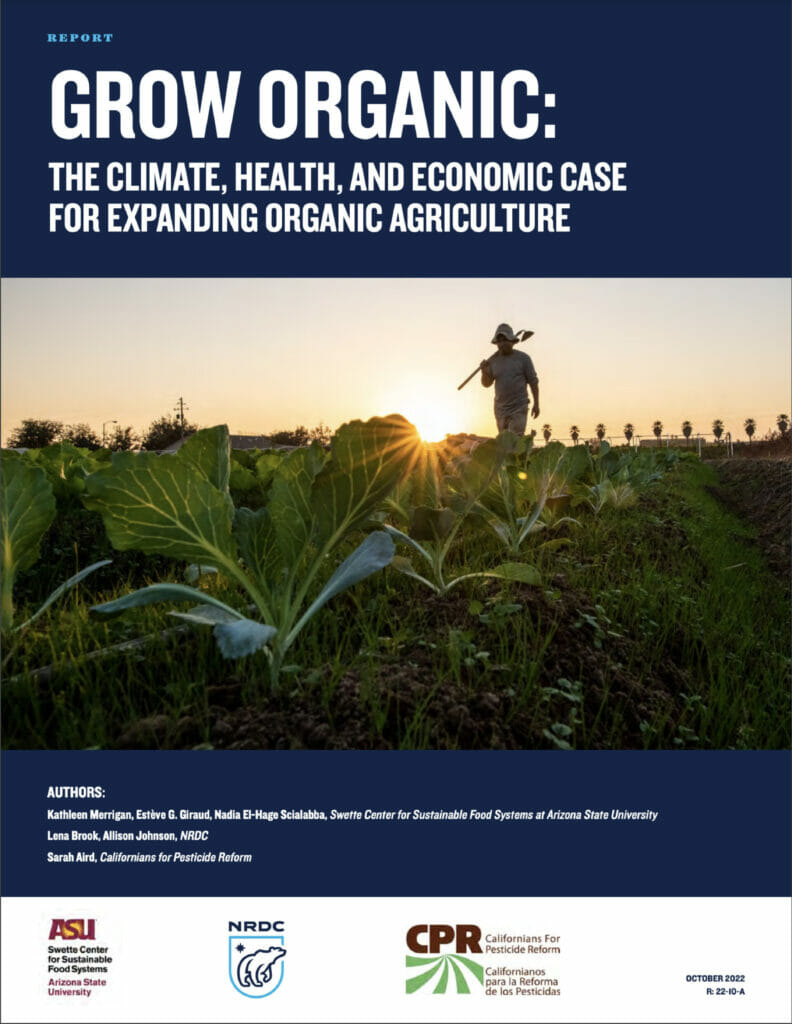
Grow Organic: The Climate, Health, and Economic Case for Expanding Organic Agriculture
Organic agriculture holds significant and largely untapped potential to address multiple crises facing our society, including climate change, health, and struggling economies. Public policies that support expansion of organic farming and ranching across America—including substantial investments in the next Farm Bill—can unlock this potential and deliver a critical triple win for our climate future, the health of farmworkers and consumers, and prosperity in farming communities.
Journal articles
- Giraud, E. G., El-Sayed, S., & Opejin, A. (2021). Gardening for Food Well-Being in the COVID-19 Era. Sustainability, 13(17), 9687. https://doi.org/10.3390/su13179687
- Giraud, E. (2021). Urban Food Autonomy: The Flourishing of an Ethics of Care for Sustainability. Humanities, 10(1), 48. https://doi.org/10.3390/h10010048
The Conversation
- Merrigan, K. (2021, August 17). Organic food has become mainstream but still has room to grow. The Conversation. https://theconversation.com/organic-food-has-become-mainstream-but-still-has-room-to-grow-164220
- Merrigan, K. (2021, November 3). Unlike the US, Europe is setting ambitious targets for producing more organic food. The Conversation. https://theconversation.com/unlike-the-us-europe-is-setting-ambitious-targets-for-producing-more-organic-food-169078
Reports
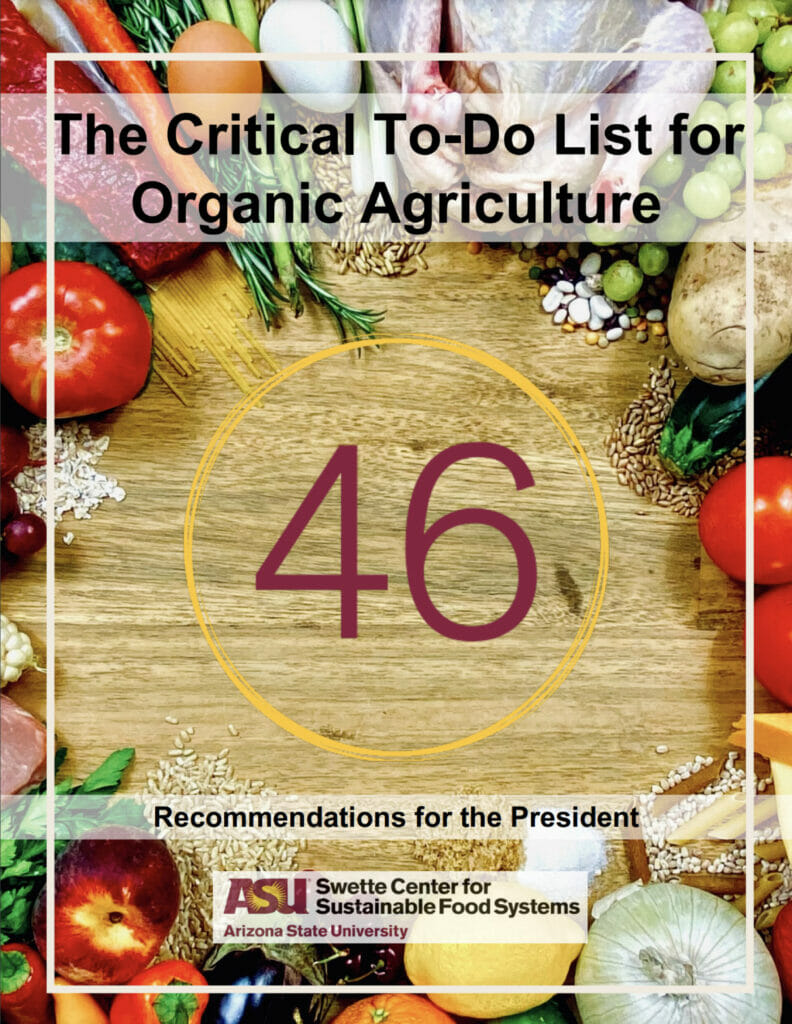
The Critical To-Do List for Organic Agriculture
Thirty years ago, Congress passed the Organic Foods Production Act (OFPA) as part of the 1990 Farm Bill. The law established strict national standards for organic food and a public-private enforcement program to ensure compliance with the law. Today, the organic industry still faces a number of challenges. This report seeks to address some of these and to provide policy recommendations to better support the growing organic industry and its positive impacts on human health, on the economy, and on climate.
Team capstone reports
With guidance and active involvement of Swette Center staff and faculty, these reports are authored by ASU graduate students pursuing a Master of Science in sustainable food systems or a Graduate Certificate in food policy and sustainability leadership.

Malu ʻUlu o Lele: Food Sovereignty and Resilience in Maui Nui Beginning with Breadfruit and Coconut
This report examines the feasibility of increasing ‘ulu (breadfruit, Artocarpus altilis) and niu (coconut, Cocos nucifera) production within Maui Nui, which is comprised of the islands of Maui, Moloka‘i, Lāna‘i, and Kaho‘olawe. The report highlights strategies to enhance ‘ulu and niu value chains and celebrates their potential to connect a new generation of residents with culturally significant Hawaiian staple foods. Recommendations are based on interviews and surveys with local subject matter experts and analysis of existing resources from Hawaiʻi and other ‘ulu and niu economies around the world. The recommendations within this report strive to capture the potential sociocultural, economic, and environmental impacts of supporting these crops at scale.

Pathways to Arizona Farmer Engagement
In partnership with the soil health company MyLand, this research examines Arizona farmer outreach and participation models aimed towards sustainable agriculture practices. The study undertakes a comprehensive examination of the agricultural landscape of the Southwest, a review of relevant literature, the administration of online surveys and interviews, and development of a communication plan tailored to both current and next-generation farmers.
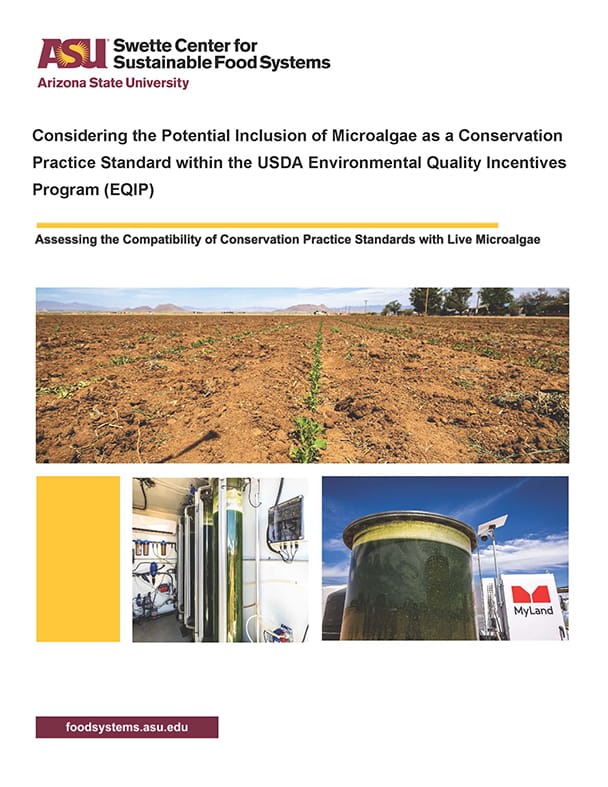
Considering the Potential Inclusion of Microalgae as a Conservation Practice Standard within the USDA Environmental Quality Incentives Program (EQIP)
The purpose of this report is to explore the potential for live microalgae to be established as a national Conservation Practice Standard (CPS) through the Natural Resources Conservation Service (NRCS). This analysis focuses on the use of live microalgae as a conservation practice, specifically through the efforts of MyLand, an Arizona-based company that operates in Arizona, California, Washington, and Alberta, Canada. MyLand specializes in cultivating the native microalgae of cropland soil and distributing them as a liquid fertilizer through irrigation systems.
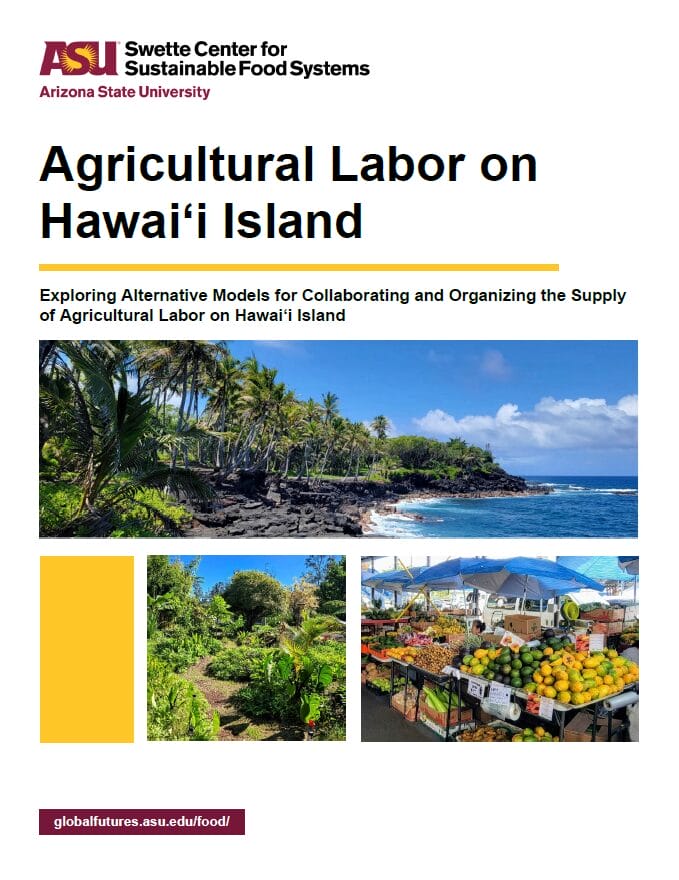
Agricultural Labor on Hawaiʻi Island
Hawaiʻi Island faces unique agricultural labor challenges due to the high cost of living, geographic isolation, and a limited labor pool. In response to these issues, the Hāmākua Institute, in collaboration with the Hawaiʻi Island Agriculture Partnership (HIAP), has sought to explore alternative models for organizing labor to support local farmers. This report aims to build on existing research by conducting a comparative analysis of local efforts across the Hawaiian Islands; collaborative models from Cuba and India; and various labor models from the United States to help identify potential labor solutions for Hawaiʻi Island’s agricultural sector.
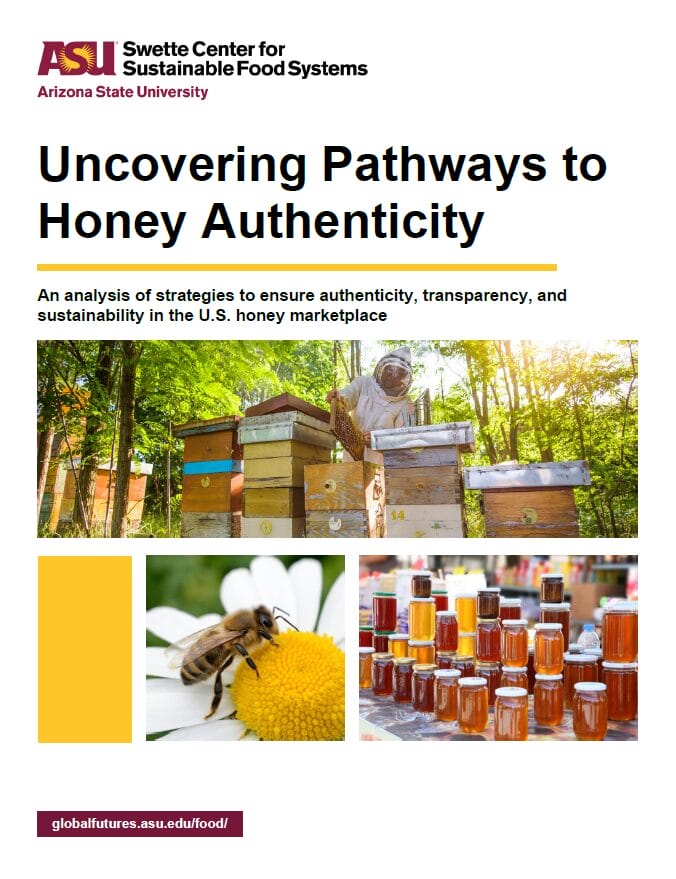
Uncovering Pathways to Honey Authenticity
This research report, exploring the impact of adulterated products on the U.S. honey market, originated from growing concerns within the honey industry about the prevalence of adulterated honey and false labeling. The specific research question that guided this project is: How is the U.S. honey market impacted by fraudulent claims and products, and what are the best strategies and policy initiatives to protect it? By addressing this question in the report, we seek to support the sustainability of authentic honey producers and improve transparency for consumers.
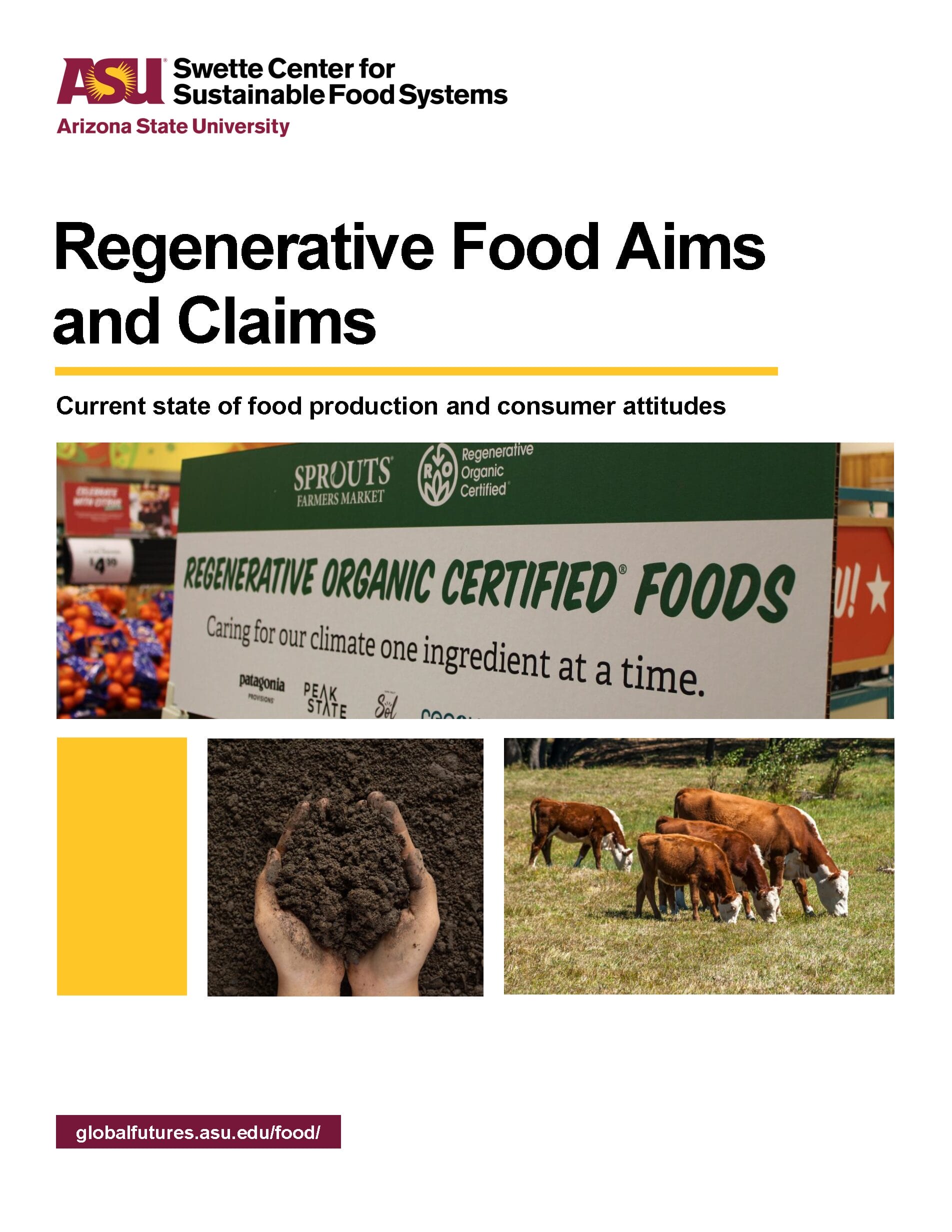
Regenerative Food Aims and Claims
Increasing consumer demand for sustainable and ethical products has sparked research interest among food retailers to identify and better understand factors which influence consumer decisions, willingness to pay, and the perceived value of regenerative labels. The purpose of this study is to explore consumer behaviors and motivations regarding regenerative products. The research team partnered with Sprouts Farmers Market on this study.
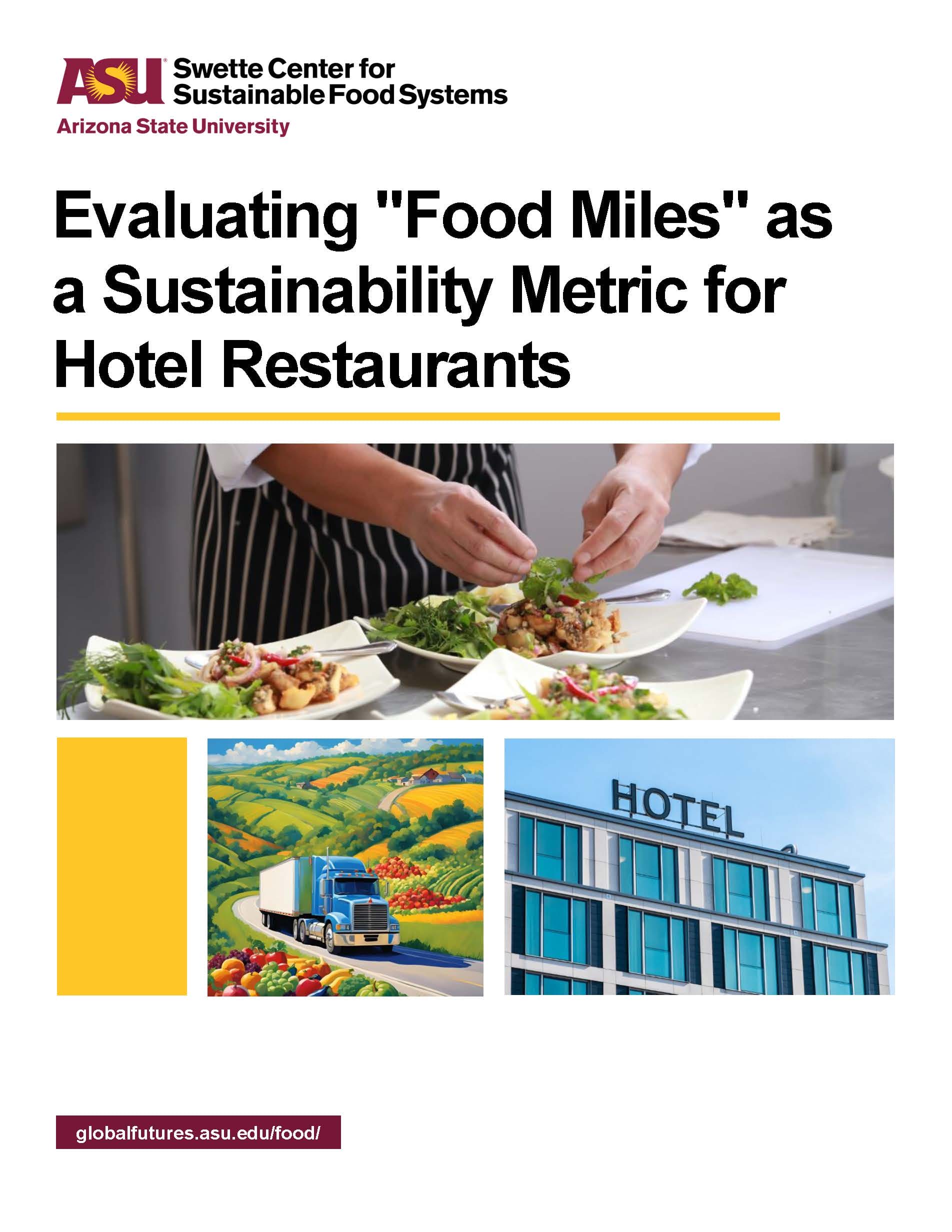
Evaluating “Food Miles” as a Sustainability Metric for Hotel Restaurants
The journey of diverse foods produced and transported over great distances has caused concern for society’s ability to meet carbon neutrality goals in the frameworks set forth by The Paris Agreement. One growing concern is food miles – the distance foods must travel from production to their place of consumption, and the energy expended within that distance based on the mode of transportation. This study, conducted in partnership with the Fairmont Scottsdale Princess, aims to understand what sustainability metrics exist to measure food miles and how they are accounted for from producer to the plate.
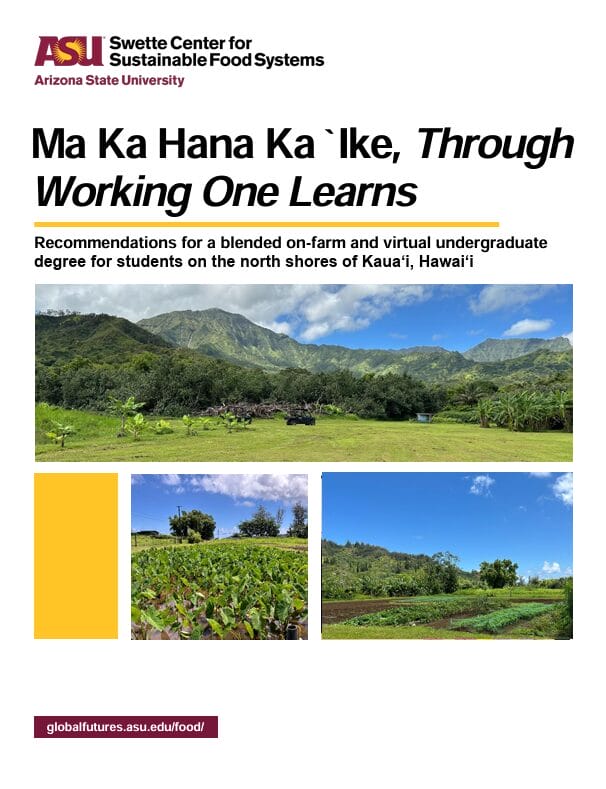
Ma Ka Hana Ka `Ike, Through Working One Learns
This report begins by providing a detailed background on the Waipā Foundation, an organization located on the North Shore of Kauaʻi that is dedicated to preserving Hawaiian cultural and environmental traditions. Following this, we present an overview of Arizona State University’s Bachelor of Science program in Sustainable Food Systems, highlighting its relevance as a model for integrating sustainability education with practical, hands-on experiences. Our research is guided by the following key question: What kind of hybrid higher education program—one that combines online coursework with experiential on-farm training—could best meet the needs of students on the North Shore of Kauaʻi?

Axis Deer Impacts in Maui County
The Maui County Department of Agriculture is working to control the overpopulation of axis deer in Maui County while also finding ways to utilize the deer as a sustainable food source to combat food insecurity. Given the high costs of living paired with the fact that over half of households in Maui County are below the ALICE (Asset-Limited, Income-Constrained, Employed) threshold, addressing food insecurity is critical. This study was conducted to identify probable axis deer population levels, assess laws and regulations, quantify monetary damage caused by the deer, and identify economically viable solutions. It focused on the impacts of axis deer on five main topic areas: environment, agriculture, food security, public health, and culture.

Best Practices for Arizona Department of Agriculture to Support Local Food Systems
The focus of this report is to demonstrate the benefits that locally focused programs offer to farmers in other states and to increase the programmatic activities related to local food system efforts throughout the state of Arizona. To ensure recommendations were made within the context of the existing local food system landscape, the research team conducted interviews with a variety of stakeholders currently active within Arizona’s local food landscape. Secondly, the research team conducted interviews and performed quantitative research on various state departments of agriculture including Idaho, Minnesota, and Vermont.
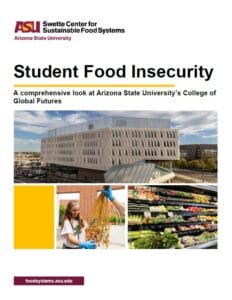
Student Food Insecurity
The Hope Center for College, Community, and Justice reported nearly 30% of students enrolled at four-year institutions experienced food insecurity during the Fall 2020 semester. This study surveyed 152 undergraduate and graduate students at Arizona State University’s College of Global Futures about their experiences with hunger and food insecurity while pursuing their degree. Institutional staff and faculty members were interviewed about the resources available to these students, as well as common themes and experiences they have noticed among students struggling with food access. This report contains an in-depth analysis of the data collected through the survey, institutional staff and faculty points of view on institutional support, and our recommendations for institutional support going forward.
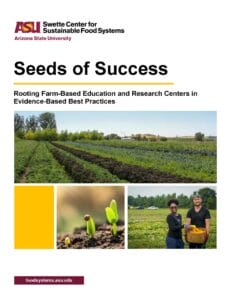
Seeds of Success
In a world intricately connected by agriculture, farm-based education and research holds an important role at the crossroads of this complex network. Amid declining agricultural literacy rates and a growing interest in the origins of sustainably produced food, farm-based education and research centers emerge as crucial bridges, providing experiential, interdisciplinary learning rooted in local contexts. This report explores what makes these types of institutions successful. It examines these organizations’ impact on food systems through a combination of primary and secondary research, and identifies gaps and opportunities within these organizations’ sphere of influence. Ultimately, it puts forward a “framework for farm-based research and education centers” to help inform and inspire leaders of these organizations.
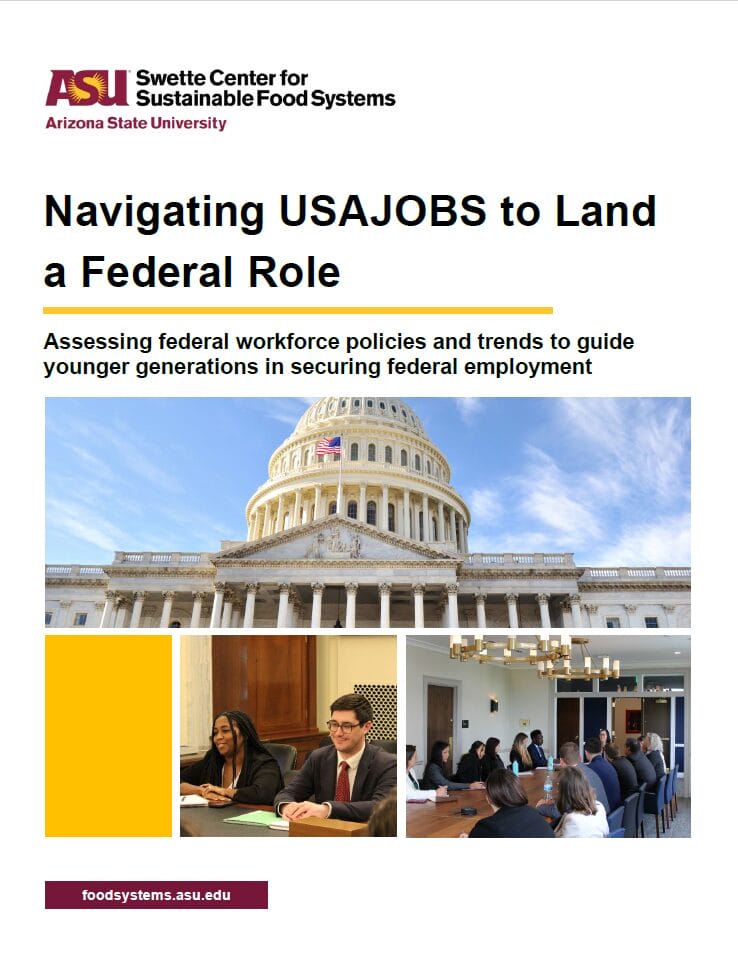
Navigating USAJobs to Land a Federal Role
The goal of this report is to present an overview of the federal workforce and the opportunities that exist for younger generations to be employed by the federal government. We explored what is preventing younger generations from seeking and securing federal employment and shed light on the benefits, value, and opportunities of federal jobs for the younger generation. With research, data, and interview insights, we developed a tangible guide for young job seekers to use to navigate USAJOBS. This guide provides applicable tips gathered from experiences of first-hand users and federal human resources specialists to help prospective applicants decipher federal job announcements and to strategically and completely prepare their applications and resumes to secure federal employment.
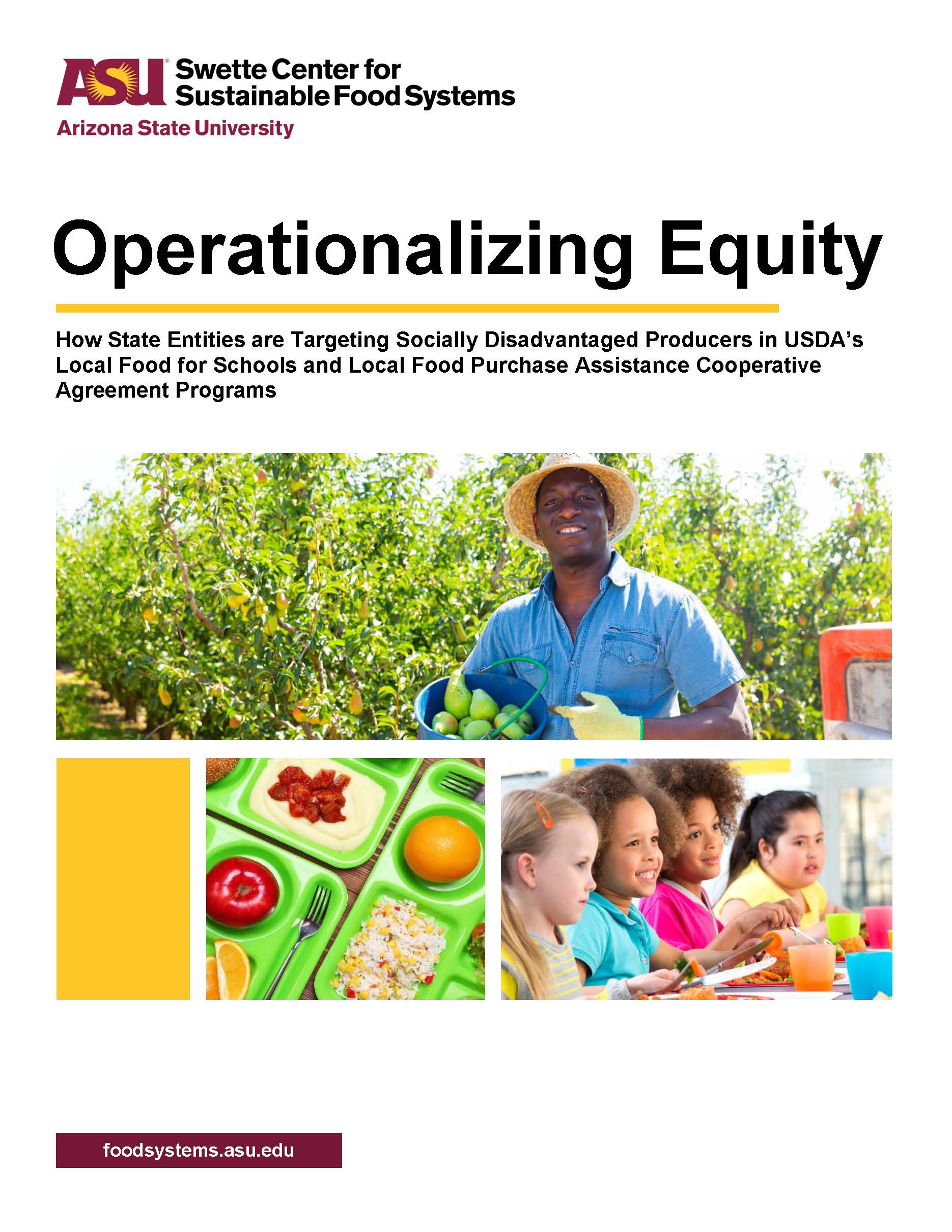
Operationalizing Equity
This study explores how state governments are using LFPA and LFS funding to develop or advance local food purchasing programs that target socially disadvantaged producers. Tribal governments were also eligible to apply for these programs, however none were engaged for this project, therefore further research is needed to understand program design by Tribal cooperators. Based on findings from a survey and interviews with state agencies, we share examples of how these programs are operationalizing equity in program design, measurement, outreach, and implementation. We discuss how learnings and outcomes can advance equity in state and federal programs.
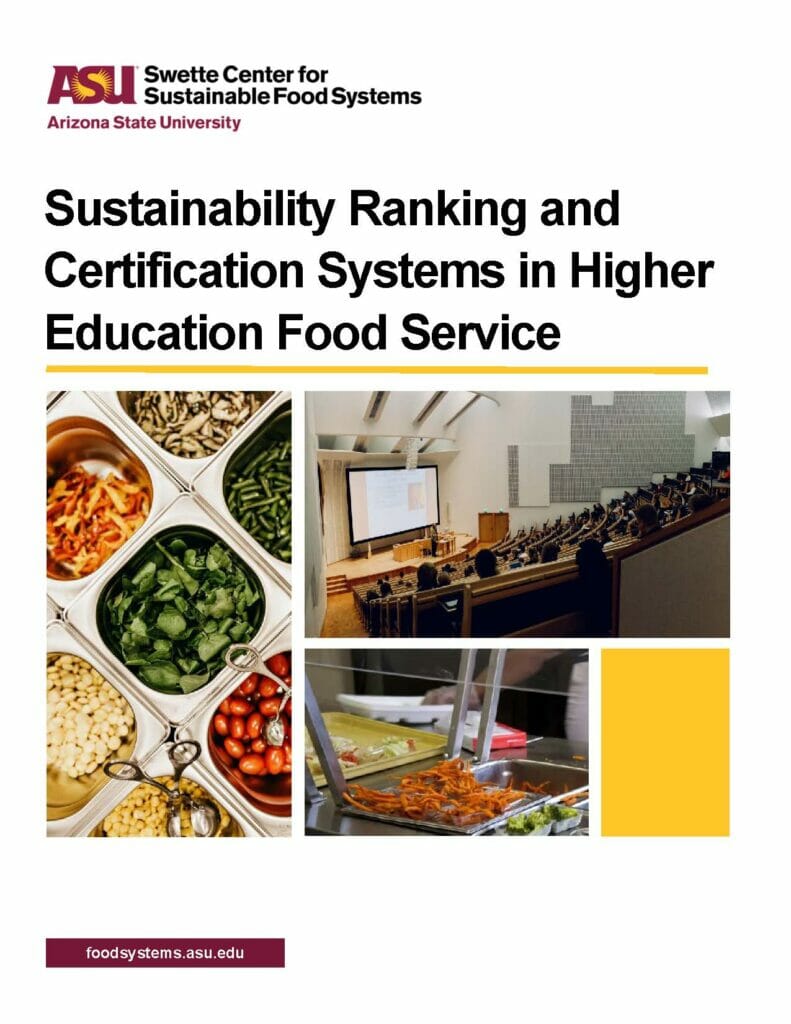
Sustainability Ranking and Certification Systems in Higher Education Food Service
This report reviews and analyzes how ranking and certification systems have an impact on the sustainable food systems used by food service providers across higher education institutions (HEIs). This analysis includes a review of the most common metrics used in higher education sustainability ranking and certification systems, as well as how assessment guidelines are determined initially and amended over time. The positive, negative, and unintended consequences of these programs are also considered as we explore ways that these sustainability metrics can meet the challenges required for a sustainable future.

State Agricultural Water Quality Programs
As record-breaking drought conditions continue year after year in Arizona, the state needs to act now to fully protect its limited water resources. While current dialogue focuses on issues of water quantity in Arizona, with limited quantity of water resources water quality becomes even more important. Farmers are a major user of water, and there remains a lot of room for improvement in agricultural water usage. This report researched existing water quality programs and voluntary state agricultural water quality initiatives both in Arizona and throughout the United States to propose policy and program recommendations for agricultural water management in Arizona.
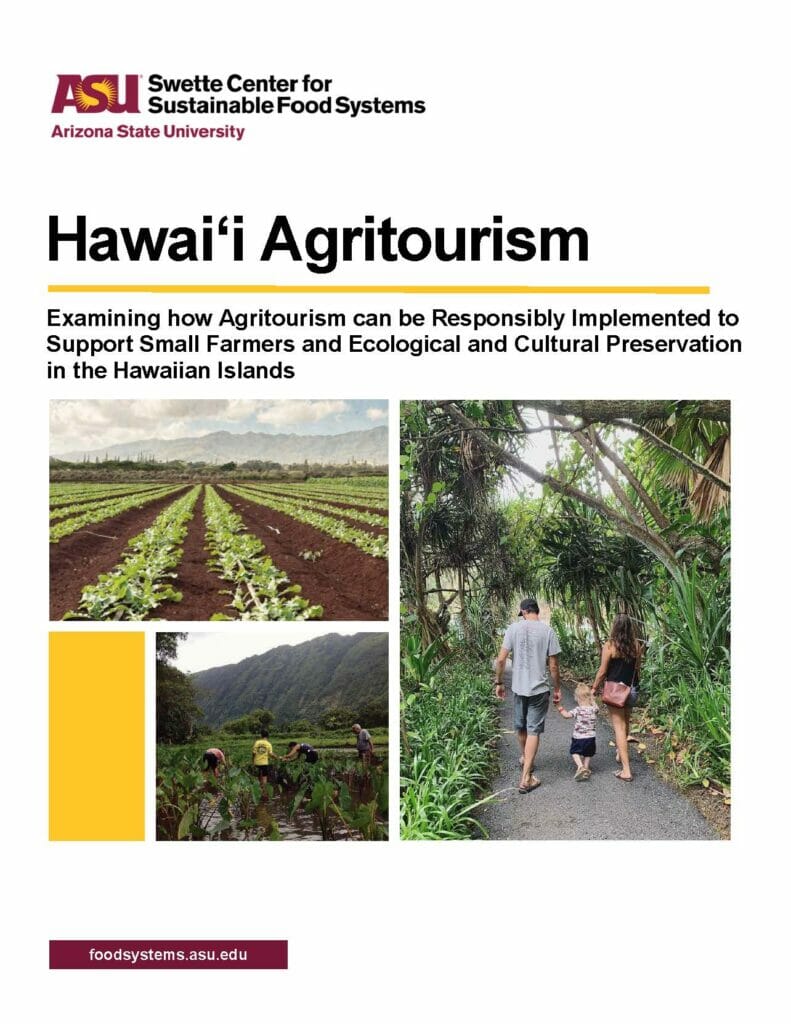
Hawaiʻi Agritourism
More than 10 million visitors traveled to Hawaiʻi in 2019, placing an enormous strain on a food system already burdened by a disproportionate reliance on imported food. Agritourism may be one solution for farmers to diversify their income, increase consumption of locally produced food, and connect farmers to local consumers. But in a place with such a robust tourism infrastructure, how can it be responsibly implemented and utilized in a way that benefits local farmers, residents, the environment, and rural and Native Hawaiian culture? This report endeavors to answer this question through a comprehensive examination of agritourism in the islands as it exists today, and by providing recommendations for agritourism in Hawaiʻi going forward.

Meatless Monday Best Practices
Meatless Monday is an initiative that encourages actionable steps toward the reduction of meat consumption by asking participants to eat meat-free on Mondays. Such initiatives provide an opportunity to educate consumers on the health benefits of a plant-forward diet, the environmental impact of meat production, animal welfare issues, the innovation of non-meat proteins, and to engage stakeholders in gaining more control over their food choices. This report offers a summary of seven Meatless Monday initiatives throughout the U.S., highlighting best practices and notable challenges of implementing and maintaining such an initiative in three different contexts: local government, school systems, and non-profit or volunteer-led organizations.

Harnessing the Power of Digitalization to Advance Local and Regional Agriculture
This report investigates the big question: “How does digitalization of agriculture and agrifood systems affect local and regional food systems?” The report, produced for TMG Think Tank for Sustainability, examines the different challenges and opportunities in digitalization across the food system in the United States, using four focal areas: COVID-19, the digital divide, urban food systems, and data for ecosystem services.
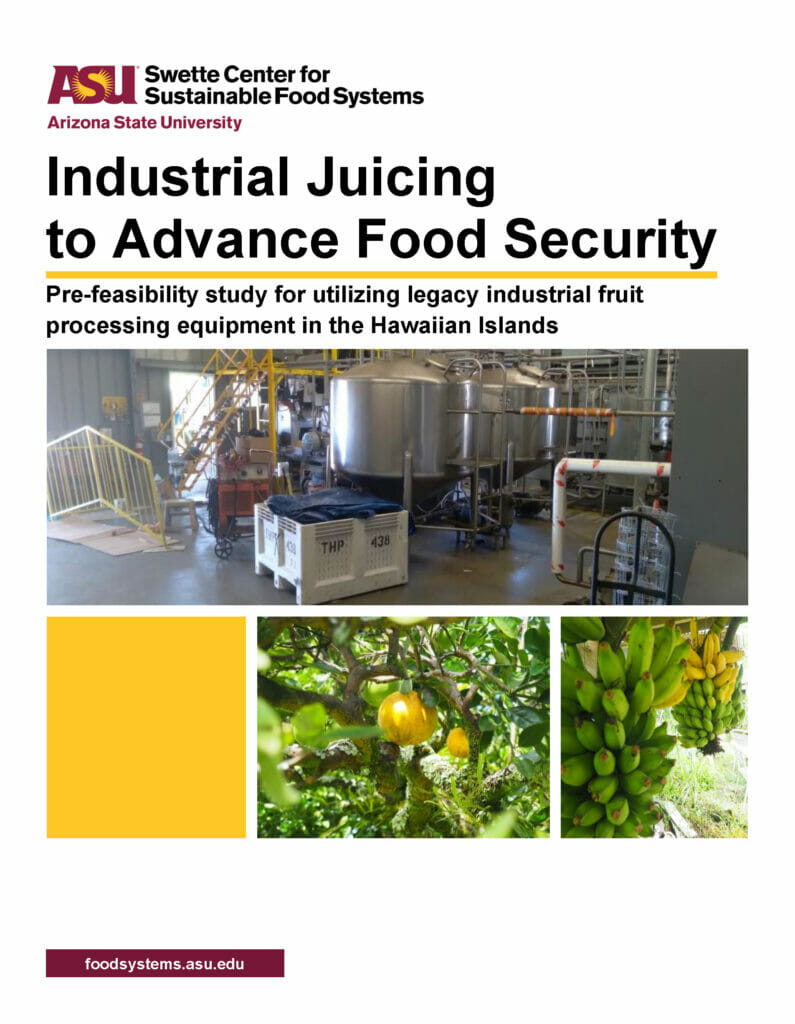
Industrial Juicing to Advance Food Security
The Hawaiian Islands are highly reliant on imported foods for feeding residents and visitors alike. This is in part due to a shortage in food processing infrastructure locally that would contribute to Hawaiʻi’s ability to process much of its own food products. This study examines the feasibility of increasing food self-sufficiency in the islands through utilizing legacy industrial fruit processing equipment recently acquired by Olohana Foundation, a small 501(c)3 non-profit in Hawaiʻi. This study asks: How can the Olohana Foundation develop their aseptic juicing line to best support increased food self-sufficiency in the islands? Additionally, how can the juicing line be re-deployed in a manner to provide sustainable economic opportunity to producers and other community members?
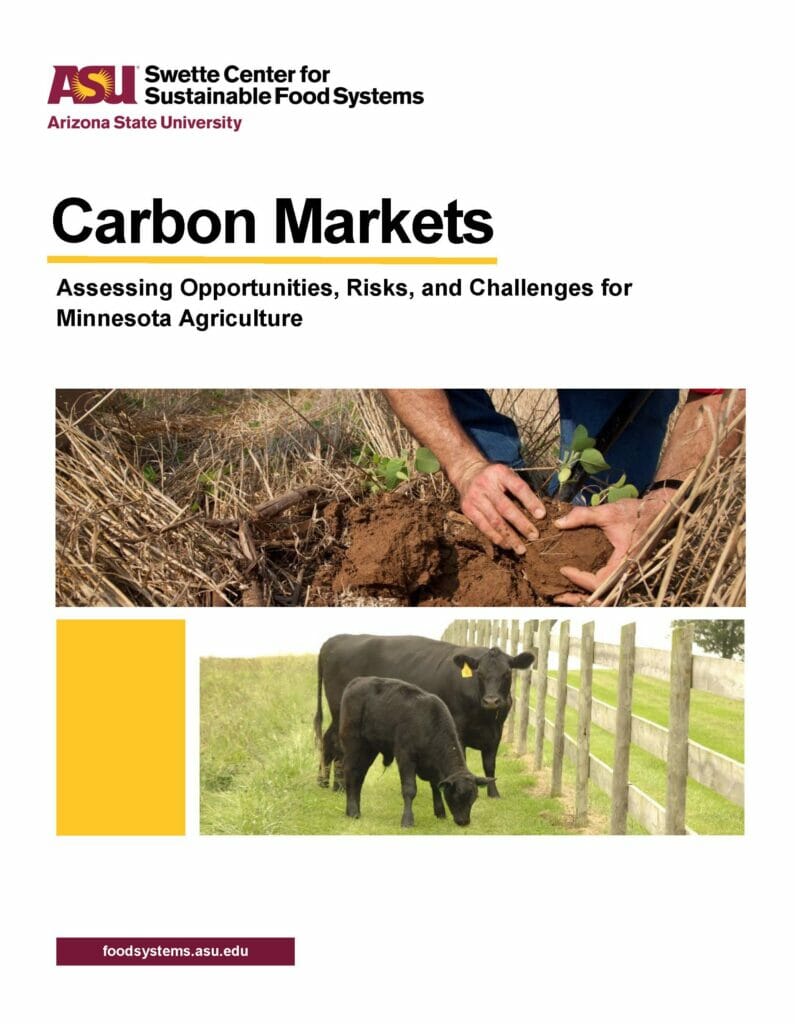
Carbon Markets
With increasing climate impacts predicted across the globe, many see soil carbon storage and sequestration as an opportunity to reduce atmospheric carbon and mitigate climate change. This report assesses the current opportunities for Minnesota agriculture and proposes solutions, policies, and management practices for these markets to benefit farmers and Minnesota’s agricultural sector.
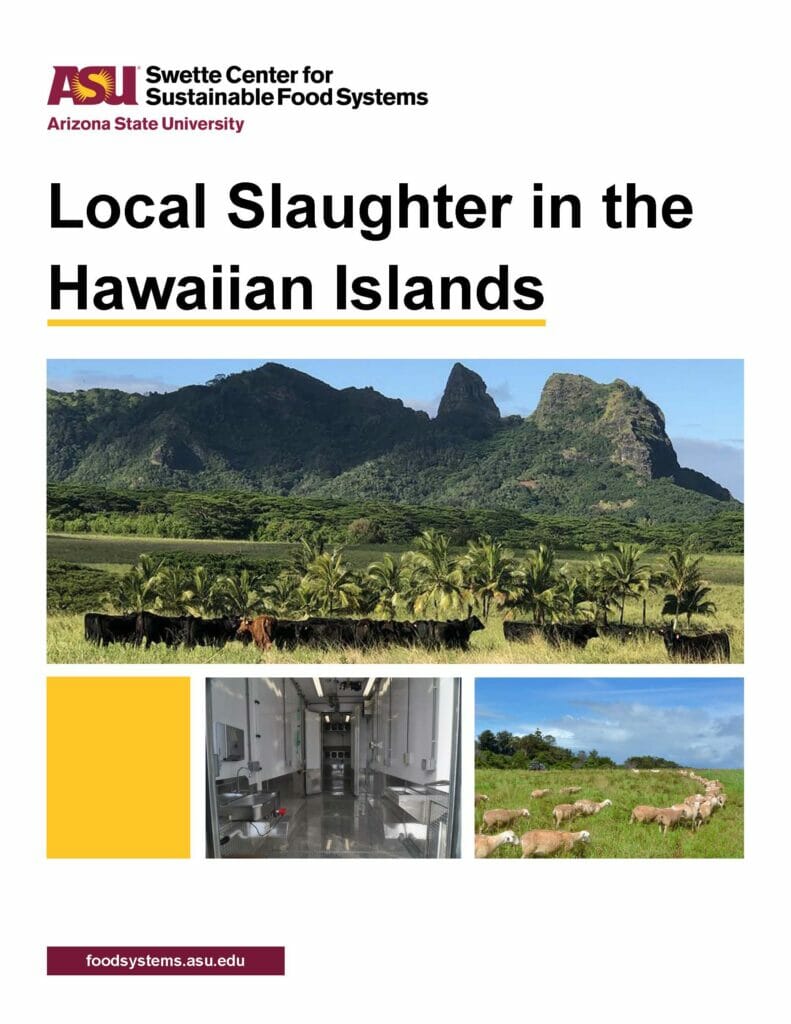
Local Slaughter in the Hawaiian Islands
Cattle and livestock make up a significant portion of agricultural production value in Hawaiʻi. However, 95 percent of Hawaiʻi-raised cattle are shipped to the Continental United States for grain-finishing and slaughter. The purpose of this report is to provide an overview of current ranching and slaughter capacities in Hawaiʻi, highlight relevant regulations and identify missing elements, offer case studies of similar operations and their procedures, and provide recommendations that Hōkūnui might consider in their pursuit to expand their slaughter capacity, while processing slaughter waste safely and sustainably.
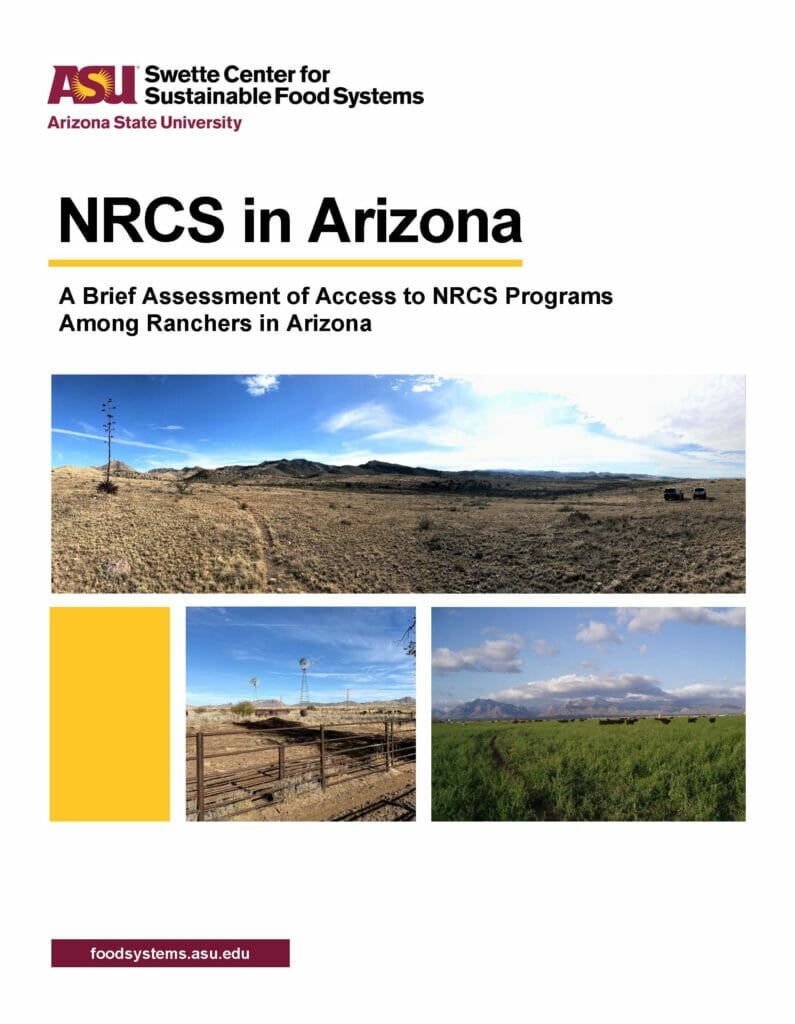
NRCS in Arizona
EQIP provides financial and technical assistance to agricultural producers to implement certain approved conservation practices. The program is available to producers through a competitive application process during which applications are ranked based on criteria developed by both the NRCS national headquarters and NRCS State Conservationists.This report assesses the barriers faced by ranching clients and potential clients of NRCS in Arizona and highlights opportunities for mitigating those challenges in the future especially through the implementation of the three key 2018 farm bill changes.
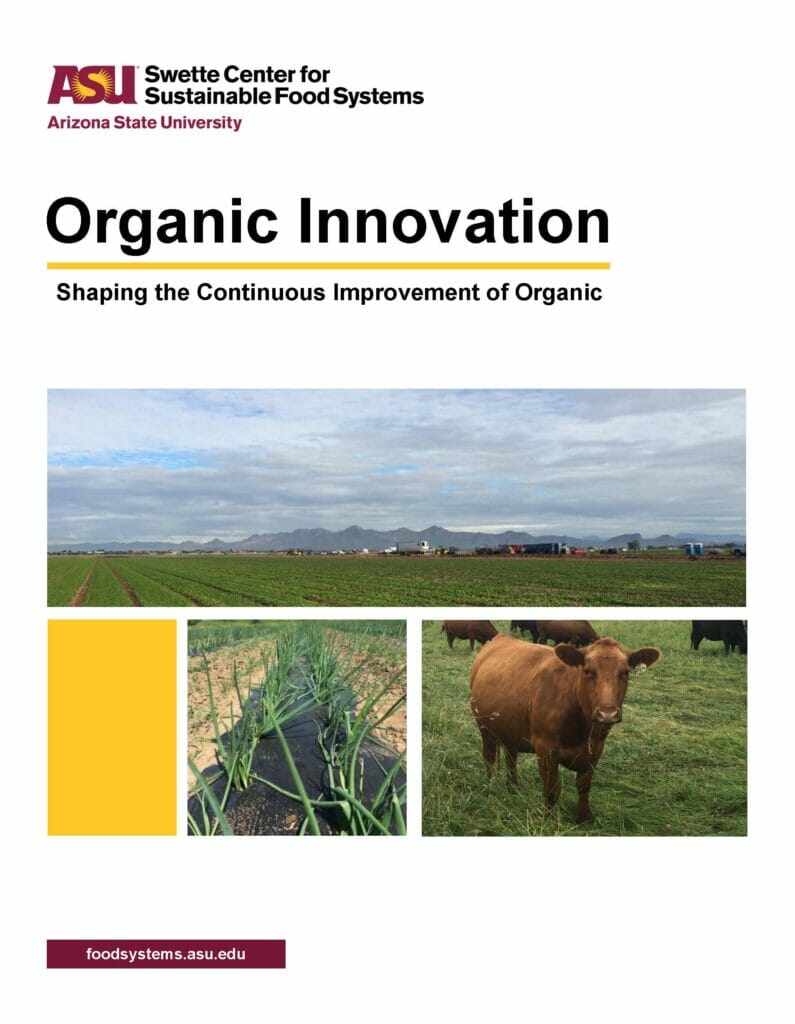
Organic Innovation
Organic continues to be one of the fastest growing sectors in the United States.This year marks 30 years since enactment of the Organic Foods Production Act.This report is a compilation of opportunities for organic innovation – it is an organic innovation catalogue – and deep dives on specific opportunities that may be of interest for the Organic Trade Association, or others, to pursue as distinct initiatives.
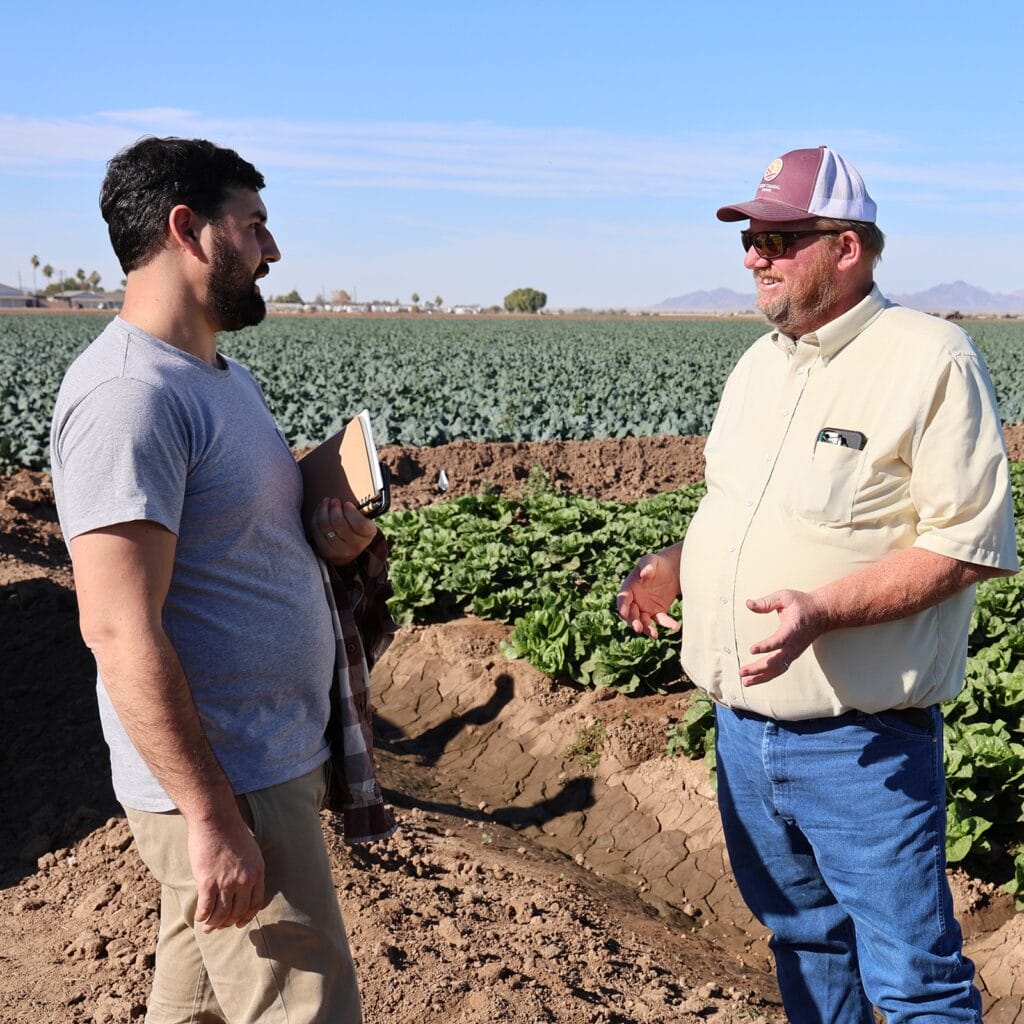
Research priorities
With a robust team of faculty, staff, senior fellows, students, and affiliated faculty, the Swette Center engages in a broad portfolio of research aimed at transforming food systems. That said, from the start we established six strategic research priorities to focus our work:





